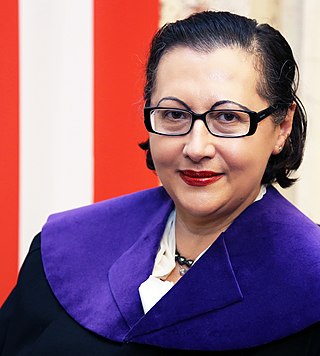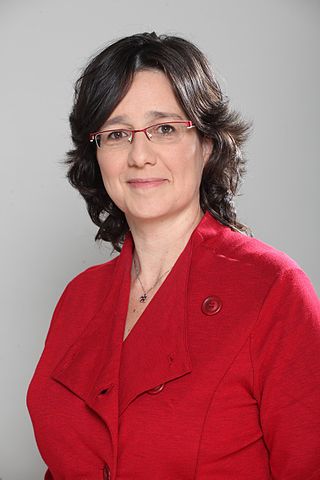Related Research Articles

Politics of Ghana takes place in a framework of a presidential representative democratic republic, whereby the president of Ghana is both head of state and head of government, and of a two party system. The seat of government is at Golden Jubilee House. Executive power is exercised by the government. Legislative power is vested in both the government and Parliament. The judiciary is independent of the executive and the legislature.

The Convention on the Elimination of all Forms of Discrimination Against Women (CEDAW) is an international treaty adopted in 1979 by the United Nations General Assembly. Described as an international bill of rights for women, it was instituted on 3 September 1981 and has been ratified by 189 states. Over fifty countries that have ratified the convention have done so subject to certain declarations, reservations, and objections, including 38 countries who rejected the enforcement article 29, which addresses means of settlement for disputes concerning the interpretation or application of the convention. Australia's declaration noted the limitations on central government power resulting from its federal constitutional system. The United States and Palau have signed, but not ratified the treaty. The Holy See, Iran, Somalia, Sudan, and Tonga are not signatories to CEDAW.
Equality Now is a non-governmental organization founded in 1992 to advocate for the protection and promotion of the human rights of women and girls. Equality Now works through public policy channels to create a just world for women and girls. Through a combination of regional partnerships, community mobilization and legal advocacy the organization works to encourage governments to adopt, improve and enforce laws that protect and promote women and girls' rights around the world.

Sophia Abena Boafoa Akuffo was the chief justice of Ghana from 19 June 2017 until 20 December 2019. She had been a judge in the Supreme Court of Ghana since 1995.
Akua Kuenyehia is a Ghanaian academic and lawyer who served as judge of the International Criminal Court (ICC) from 2003 to 2015. She also served as First Vice-president of the Court. She was one of the three female African judges at the ICC.
Gay Johnson McDougall is an American lawyer who has spent her career addressing international human rights and racial discrimination. She is currently a Distinguished Scholar-in-Residence at the Leitner Center on International Law and Justice of Fordham University Law School. She was executive director of Global Rights, Partners for Justice. In August 2005, she was named the first United Nations Independent Expert on Minority Issues, serving until 2011.

Hanna Serwaa Tetteh is a Ghanaian barrister and politician. She served in the cabinet of Ghana as Minister for Trade and Industry from 2009 to 2013 and Minister for Foreign Affairs from 2013 to 2017. She was also the Member of Parliament for the Awutu-Senya West constituency. She currently serves as the UN Secretary General's Special Envoy for the Horn of Africa.

Lilian Hofmeister is a leading Austrian expert in the field of advancement of women's rights, women's access to justice and in particular elimination of discrimination against women. She worked as a judge in Austria for more than 30 years and has served as Substitute Justice at the Austrian Constitutional Court since 1998.
Yoko Hayashi is a Japanese lawyer and partner in the Athena Law Office. She was formerly an alternate member to the United Nations Sub-Commission on the Promotion and Protection of Human Rights from 2004 to 2006. In 2008, she became a member of the Committee which monitors the Convention on the Elimination of All Forms of Discrimination against Women (CEDAW), and in 2015 was serving as Chairperson of the Committee on the Elimination of Discrimination against Women. Hayashi has used her legal expertise to improve the status and protect the rights of women.
Violence against women in New Zealand is described as the kinds of violence disproportionately affecting women compared to men, due to factors of ongoing gender inequality in society. The New Zealand government and justice system view efforts to prevent and deal with violence against women as a priority of New Zealand legislation and the criminal justice system.

Annie Ruth Jiagge, , also known as Annie Baëta Jiagge, was a Ghanaian lawyer, judge and women's rights activist. She was the first woman in Ghana and the Commonwealth of Nations to become a judge. She was a principal drafter of the Declaration on the Elimination of Discrimination Against Women and a co-founder of the organisation that became Women's World Banking.

Kalpana Kannabiran is an Indian sociologist, lawyer, human rights columnist, writer and editor based in Hyderabad, India. In March 2021, after a decade-long tenure, she retired from the post of Professor and Regional Director of the Council for Social Development, Southern Regional Centre, a research institute recognised by the Indian Council of Social Science Research. She is amongst the founding faculty of NALSAR University of Law, Hyderabad, and is a co-founder of the women's rights group, Asmita Resource Centre for Women, established in 1991 in Hyderabad. She was nominated as the Civil Society Advisory Governor for Asia by the Commonwealth Foundation, London in January 2020 for a term of three years. At present, Kannabiran is a Distinguished Professor at the Council for Social Development.
Sophia Ophelia Adjeibea Adinyira is a Ghanaian retired Justice of the Supreme Court of Ghana and a member of the United Nations Appeal Tribunal.
Barbara Evelyn Bailey OJ is an educator, writer and gender studies scholar from Kingston, Jamaica. In addition to her education work, she has represented Jamaica at numerous conferences and assemblies regarding women's rights. In 2008, she was elected by the state parties as a member of the United Nations Committee on the Elimination of Discrimination against Women.

Samira Bawumia is a Ghanaian politician and the Second Lady of the Republic of Ghana. She is married to the Vice President of Ghana, Mahamudu Bawumia. She received the Ghanaian Women Association of Georgia Global Humanitarian Award, an honor from the Atlanta City Council and is also recognized by the Macon Bibb country. She graduated from the University of London with a bachelor’s degree in law.
Marital rape generally refers to non-consensual sexual intercourse between married spouses. In Singapore, there used to be a partial immunity for marital rape first introduced during British colonial rule because it was deemed not a criminal offence except when the wife is below 13 years of age or when any of the specific circumstances provided under section 375(4) of the Singapore Penal Code are satisfied. Since 1 January 2020, the law was repealed and its immunity lifted under the Criminal Law Reform Act 2019, criminalising marital rape.

Laadi Ayii Ayamba is a Ghanaian politician and member of the 8th parliament of the 4th Republic of Ghana representing the Pusiga Constituency in the Upper East Region on the ticket of the National Democratic Congress. She was also a member of the 6th and 7th parliament. She is a woman activist and mostly addresses issues relating to women on the floor of parliament. She served as the chairperson of the Committee on Gender and Children in the 6th parliament of the 4th Republic of Ghana from 2013 to 2017.

Daphna Hacker is a full professor at the Tel Aviv University law faculty and Women and Gender Studies Program. After publishing Legalized Families in the Era of Bordered Globalization, Hacker was awarded the 2018 LSA Jacob Book prize.
Anamah Tan is a Singaporean family law attorney and lobbyist.
Rangita de Silva de Alwis is a Sri Lankan-American academic, lawyer and women's rights expert. She is well known as a strong advocate demanding equal and fair representation of women in all spheres. She has worked in over 25 countries as a human rights scholar with different governmental organizations, non-governmental organizations, and academic institutions.
References
- 1 2 3 4 "President Nominates Hillary Gbedemah For CEDAW". m.peacefmonline.com. Retrieved 2019-11-05.
- ↑ "Ghanaian re-elected to serve on UN committee against discrimination of women". www.pulse.com.gh. 2016-06-22. Archived from the original on 2019-11-05. Retrieved 2019-11-05.
- 1 2 3 4 "President nominates Hilary Gbedemah for CEDAW". ghananewsagency.org. Retrieved 2019-11-05.
- ↑ "Ghana elected to UN Committee". www.ghanaweb.com. Retrieved 2019-11-05.
- 1 2 3 "Ms Gbedemah re-nominated to serve on CEDAW". Graphic Online. 2016-04-09. Retrieved 2019-11-05.
- 1 2 3 "Mahama re-nominates Hilary Gbedemah for UN CEDAW". Ghana Permanent Mission to the United Nations. 2016-04-17. Retrieved 2019-11-05.